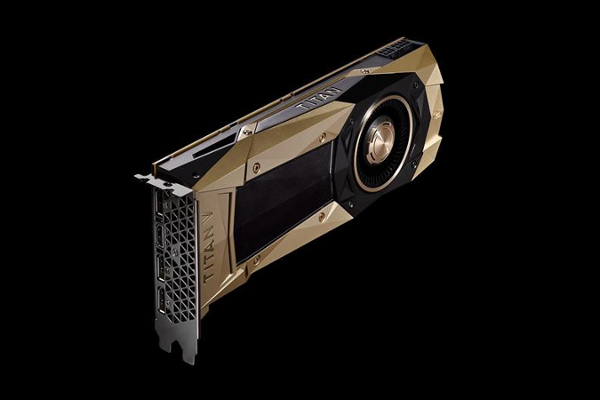 EMERGING TECH
EMERGING TECH
 EMERGING TECH
EMERGING TECH
 EMERGING TECH
EMERGING TECH
Nvidia Corp.’s new Titan V graphics processing unit shares little resemblance to the earlier gaming-oriented chips in the series.
The GPU, which the company unveiled Thursday night, retails for $2,999 and is geared toward artificial intelligence applications. Unlike other Nvidia graphics cards optimized for AI, however, it’s designed to be used in desktops rather than servers. The chip will enable developers to run neural network projects on a local machine instead of having to set up a prototyping environment on remote infrastructure.
The Titan V packs 21.1 billion transistors and a hefty 12 gigabytes of on-board memory. Nvidia claims that the chip can deliver up to 110 teraflops of performance, 9 times as much as the previous-generation Titan X that it introduced last year. According to the company, this makes the new card the world’s most powerful desktop GPU.
The performance boost can be attributed mainly to the fact that the Titan V is based on Nvidia’s latest-generation Volta chip architecture. Unveiled in May, the design brings several major innovations to the table, most notably Tensor Cores. These are specialized circuits built for deep learning that perform the complex mathematical operations involved in running an AI more efficiently than regular silicon.
Nvidia’s decision to make the Volta architecture available for desktops sheds more light on the motivation behind another recent move: the introduction of PC support for its GPU Cloud toolkit on Monday. The suite provides access to prepackaged versions of popular AI development tools such as TensorFlow that are optimized to make the most out of the graphics chips on which they run.
GPU Cloud has already included support for Nvidia’s DGX Station. The machine is touted as a “personal supercomputer” built specifically for AI developers and packs four Tesla V100 GPUs, which are based on the Volta design just like the Titan V. There’s also a speedy Xeon E5-2698 processor from Intel Corp. for handling general-purpose computing tasks.
The Titan V is a much more accessible option for local AI development in comparison, even with its $2,999 price tag. Nvidia is offering the chip via its website with a limit of two units per customer.
Support our mission to keep content open and free by engaging with theCUBE community. Join theCUBE’s Alumni Trust Network, where technology leaders connect, share intelligence and create opportunities.
Founded by tech visionaries John Furrier and Dave Vellante, SiliconANGLE Media has built a dynamic ecosystem of industry-leading digital media brands that reach 15+ million elite tech professionals. Our new proprietary theCUBE AI Video Cloud is breaking ground in audience interaction, leveraging theCUBEai.com neural network to help technology companies make data-driven decisions and stay at the forefront of industry conversations.